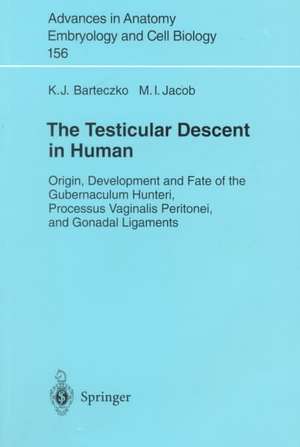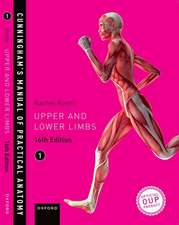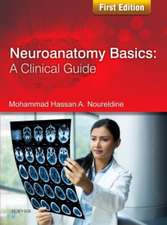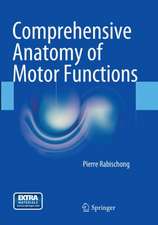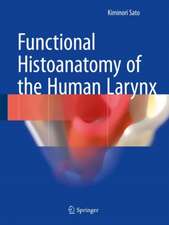The Testicular Descent in Human: Origin, Development and Fate of the Gubernaculum Hunteri, Processus Vaginalis Peritonei, and Gonadal Ligaments: Advances in Anatomy, Embryology and Cell Biology, cartea 156
Autor K.J. Barteczko, M.I. Jacoben Limba Engleză Paperback – 26 iul 2000
Din seria Advances in Anatomy, Embryology and Cell Biology
- 5%
 Preț: 1146.33 lei
Preț: 1146.33 lei - 5%
 Preț: 721.19 lei
Preț: 721.19 lei - 15%
 Preț: 637.13 lei
Preț: 637.13 lei -
 Preț: 381.81 lei
Preț: 381.81 lei - 15%
 Preț: 644.95 lei
Preț: 644.95 lei - 5%
 Preț: 1025.16 lei
Preț: 1025.16 lei - 15%
 Preț: 689.97 lei
Preț: 689.97 lei - 15%
 Preț: 577.07 lei
Preț: 577.07 lei - 15%
 Preț: 580.36 lei
Preț: 580.36 lei - 5%
 Preț: 393.51 lei
Preț: 393.51 lei -
 Preț: 408.66 lei
Preț: 408.66 lei -
![Die Schlüpfdrüse der Geburtshelferkröte (Alytes o. obstetricans [LAURENTI]) und anderer Froschlurche](https://i4.books-express.ro/bs/9783662239742/die-schluepfdruese-der-geburtshelferkroete-alytes-o-obstetricans-laurenti-und-anderer-froschlurche.jpg) Preț: 408.27 lei
Preț: 408.27 lei - 5%
 Preț: 1090.61 lei
Preț: 1090.61 lei - 5%
 Preț: 705.11 lei
Preț: 705.11 lei - 5%
 Preț: 706.04 lei
Preț: 706.04 lei - 5%
 Preț: 357.61 lei
Preț: 357.61 lei - 5%
 Preț: 704.59 lei
Preț: 704.59 lei - 5%
 Preț: 705.11 lei
Preț: 705.11 lei - 5%
 Preț: 359.42 lei
Preț: 359.42 lei - 5%
 Preț: 711.52 lei
Preț: 711.52 lei - 15%
 Preț: 635.47 lei
Preț: 635.47 lei - 15%
 Preț: 631.72 lei
Preț: 631.72 lei - 15%
 Preț: 633.35 lei
Preț: 633.35 lei - 15%
 Preț: 632.37 lei
Preț: 632.37 lei - 5%
 Preț: 706.60 lei
Preț: 706.60 lei - 15%
 Preț: 631.07 lei
Preț: 631.07 lei - 5%
 Preț: 707.13 lei
Preț: 707.13 lei - 5%
 Preț: 707.33 lei
Preț: 707.33 lei - 5%
 Preț: 359.60 lei
Preț: 359.60 lei - 5%
 Preț: 707.69 lei
Preț: 707.69 lei - 5%
 Preț: 707.13 lei
Preț: 707.13 lei - 5%
 Preț: 708.06 lei
Preț: 708.06 lei - 5%
 Preț: 706.41 lei
Preț: 706.41 lei - 5%
 Preț: 708.78 lei
Preț: 708.78 lei - 5%
 Preț: 705.68 lei
Preț: 705.68 lei - 5%
 Preț: 705.11 lei
Preț: 705.11 lei - 5%
 Preț: 706.77 lei
Preț: 706.77 lei - 15%
 Preț: 635.15 lei
Preț: 635.15 lei - 15%
 Preț: 631.07 lei
Preț: 631.07 lei - 5%
 Preț: 706.77 lei
Preț: 706.77 lei - 5%
 Preț: 706.04 lei
Preț: 706.04 lei - 5%
 Preț: 710.79 lei
Preț: 710.79 lei - 5%
 Preț: 705.32 lei
Preț: 705.32 lei - 15%
 Preț: 633.19 lei
Preț: 633.19 lei - 15%
 Preț: 629.09 lei
Preț: 629.09 lei - 15%
 Preț: 633.53 lei
Preț: 633.53 lei - 15%
 Preț: 632.70 lei
Preț: 632.70 lei - 15%
 Preț: 633.68 lei
Preț: 633.68 lei - 18%
 Preț: 773.72 lei
Preț: 773.72 lei - 15%
 Preț: 630.43 lei
Preț: 630.43 lei
Preț: 358.69 lei
Preț vechi: 377.57 lei
-5% Nou
Puncte Express: 538
Preț estimativ în valută:
68.66€ • 74.60$ • 57.71£
68.66€ • 74.60$ • 57.71£
Carte tipărită la comandă
Livrare economică 21 aprilie-05 mai
Preluare comenzi: 021 569.72.76
Specificații
ISBN-13: 9783540673156
ISBN-10: 3540673156
Pagini: 112
Ilustrații: X, 98 p.
Dimensiuni: 155 x 235 x 6 mm
Greutate: 0.17 kg
Ediția:Softcover reprint of the original 1st ed. 2000
Editura: Springer Berlin, Heidelberg
Colecția Springer
Seria Advances in Anatomy, Embryology and Cell Biology
Locul publicării:Berlin, Heidelberg, Germany
ISBN-10: 3540673156
Pagini: 112
Ilustrații: X, 98 p.
Dimensiuni: 155 x 235 x 6 mm
Greutate: 0.17 kg
Ediția:Softcover reprint of the original 1st ed. 2000
Editura: Springer Berlin, Heidelberg
Colecția Springer
Seria Advances in Anatomy, Embryology and Cell Biology
Locul publicării:Berlin, Heidelberg, Germany
Public țintă
ResearchCuprins
1 Introduction.- 2 Materials and Methods.- 2.1 Scanning Electron Microscopy.- 2.2 Immunohistochemistry.- 3 Transabdominal (Inner) Descent of Gonads — Anlage of Diaphragm and Cranial Mesonephric Ligament.- 4 Development, Shape and Fate of the Gubernaculum Hunteri and Processus Vaginalis Peritonei — Phases of Testicular Descent.- 4.1 Results.- 4.2 Discussion.- 5 Origin of the Caudal Ligaments of the Ovary and Uterus.- 6 Summary and Conclusions.- References.
Textul de pe ultima copertă
The testicular descent (descensus testis) is described in a complete series of human material from stage 14 CC to the adult state by using own phases. Central points of interest in this work are answers to questions which have been discussed controversially by generations of scientists and which are wrong or inadequately documented in most textbooks of embryology: Does an inner gonadal descent exist? What about origin, role and fate of gubernaculum H., processus vaginalis peritonei and gonadal ligaments? How do the annexes of testis come into their final position? The results are based on serial sections, scanning electron microscopy, three-dimensional reconstructions, microdissection and immunohistochemistry.
